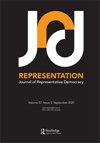沟通团结吗?公众对英国政府通报COVID-19的反应
Q2 Social Sciences
引用次数: 0
摘要
本文探讨了公众对英国政府关于COVID-19的沟通的反应,重点是公众团结是有效应对大流行的关键部分。根据与公众的焦点小组研究,我们确定了政府在传达团结的方式上的三个限制。团结的意义和要求并不总是(1)清晰易懂,(2)对所有人都有充分的理由,或(3)政治领导人自己的行动证明。最后,我们考虑了我们的分析对如何改善团结沟通的影响。除了任何具体的沟通缺陷之外,沟通团结肯定总是困难的。在大流行病背景下,团结意味着什么和需要什么在规范上从来不是不言而喻的,特别是考虑到所涉及的不同价值观和利益。鉴于此,我们建议,对团结采取一种更加审慎民主的做法,在规范上是可取的,而且更有可能有效地维持团结。但是,对这种方法的需求揭示了政治沟通环境中一个潜在的系统性弱点:缺乏足够的机会让那些被呼吁表现出团结的人来反思、竞争和塑造其意义。本文章由计算机程序翻译,如有差异,请以英文原文为准。
Communicating Solidarity? Public Responses to UK Government Communication of COVID-19
This article explores public responses to UK government communication of COVID-19, focusing on public solidarity as a crucial part of an effective pandemic response. Drawing on focus group research with members of the public, we identify three limitations in the way solidarity was communicated by government. What solidarity meant and entailed was not always (1) clear and understandable, (2) adequately justified to all, or (3) demonstrated by the actions of political leaders themselves. In conclusion, we consider the implications of our analysis for how the communication of solidarity could have been improved. Beyond any specific communicative shortcomings, communicating solidarity was always bound to be difficult. What solidarity meant and entailed in the context of the pandemic was never normatively self-evident, especially given the different values and interests at stake. Given this, we suggest that a more deliberative-democratic approach to solidarity would have been both normatively desirable and more likely to be effective in sustaining solidarity. But the need for this approach reveals an underlying systemic weakness in the political-communication environment: the lack of adequate opportunities for those called upon to show solidarity to reflect on, contest, and shape its meaning.
求助全文
通过发布文献求助,成功后即可免费获取论文全文。
去求助
来源期刊

Representation
Social Sciences-Sociology and Political Science
CiteScore
3.50
自引率
0.00%
发文量
31
期刊介绍:
This change in scope follows two paths. Firstly, it seeks contributors who are interested in exploring the interface between democratic practice and theory. In particular, this focus seeks contributions that apply theoretical insights to actual examples of current practice. Secondly, while not neglecting the current focus of the journal, we would like to expand its international coverage so that the journal will offer our readers insights in the state of democracy worldwide.
 求助内容:
求助内容: 应助结果提醒方式:
应助结果提醒方式:


